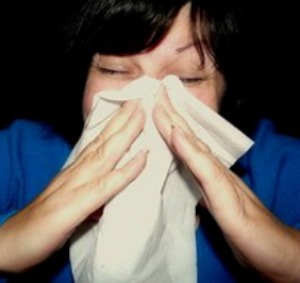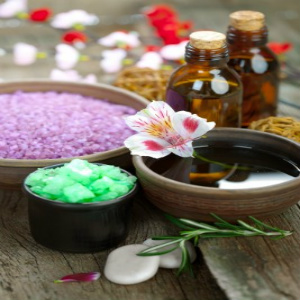- Home
- Essential Oils for Healing
- Allergy Relief
As an affiliate for Bookshop, Amazon, and other programs, I may earn a small commission for products purchased through links. This doesn't affect the price you pay. Privacy policy and disclosures.
Search this site:
How to Use Essential Oils for Allergy Relief
Aromatherapy can often help deal with the symptoms of allergies, such as congestion, runny nose, sneezing, watery eyes, headaches, and an impaired sense of smell. The best essential oils for allergy relief depend on your specific allergy and your individual response. Experiment with different oils to find what works best for you.
Essential Oils for Allergy Relief

The Complete Aromatherapy & Essential Oils Handbook for Everyday Wellness suggests the following essential oils to help relieve allergies:
- Bergamot
- Clove
- Eucalyptus (dives, radiata, globulus, smithii)
- German chamomile
- Helichrysum
- Juniper
- Lavender
- Niaouli
- Peppermint
- Ravensara
- Rosemary ct. cineole
- Rosewood
- Tea tree
Suggested bath oil blend:
- 2 drops bergamot
- 2 drops lavender
- 1 drop juniper
- 1 drop peppermint
- 1 teaspoon carrier oil
Three ways to use german chamomile or lavender for nasal allergy relief:
- Rub one drop (diluted) onto your forehead, cheeks, and sinuses, as needed.
- Diffuse using a diffuser for 15 minutes every two hours.
- Put one to two drops on one palm, rub your hands together, and place them near or over your nose. Inhale deeply a few times. Use as needed.
Essential Oil Allergy Blends
Allergy-Proof Your Life recommends the following essential oils for allergies:
- Blue tansy (Tanacetum annuum)
- Eucalyptus (Eucalyptus radiata and Eucalyptus globulus)
- Khella (Ammi visnaga)
- Peppermint (Mentha piperita)
- Tarragon (Artemesia dracunculus)
- Thyme (Thymus satureioides and Thymus vulgarus)
You can diffuse a few drops of the following essential oil blend for 10 to 20 minutes three times a day:
- 20 drops blue tansy
- 20 drops khella (if you don't have this hard-to-find oil, leave it out or substitute eucalyptus)
- 20 drops peppermint
- 20 drops tarragon
- 20 drops thyme
The Healing Intelligence of Essential Oils suggests the following blend of essential oils for allergy relief:
- 90 drops niaouli
- 10 drops blue tansy
- 3 to 4 drops peppermint
Dilute 1 to 2 drops of the blend in a carrier oil. Apply to your face. (If possible, rinse your face with cold water first and apply blend to moist skin.)
Aromatherapy Inhalers for Allergies
You can make a personal aromatherapy inhaler using one of the following blends. Drop the essential oils onto the cotton wick in the inhaler. Keep the inhaler capped. Remove the cap and inhale as needed.
For adults:
- 5 drops frankincense essential oil
- 4 drops balsam fir essential oil
- 3 drops eucalyptus essential oil
- 3 drops peppermint essential oil
or
- 5 drops ravintsara essential oil
- 5 drops tea tree essential oil
- 6 drops lavender essential oil
or
- 6 drops eucalyptus radiata essential oil
- 3 drops roman chamomile essential oil
- 6 drops frankincense essential oil
For children over 5 years old:
- 2 drops cedarwood essential oil
- 3 drops roman chamomile essential oil
- 5 drops frankincense essential oil
Source: Aromahead
For information specific to kids, see Aromatherapy for Seasonal Allergies in Children.
Allergy Blend
Use in an inhaler or diffuser.
- 5 drops lavender essential oil
- 2 drops bergamot essential oil
- 1 drop lemon essential oil
- 1 drop peppermint essential oil
- 1 drop juniper essential oil
Source: Aromatherapy: A Holistic Guide to Natural Healing with Essential Oils
Other Allergy Help
Many sources recommend a neti pot to help clean pollen, dust, dander, and other pollutants out of your nasal passages. A neti pot resembles a small teapot-shaped kettle. You fill the neti pot with warm distilled water and a little salt that doesn't contain iodine to create a saline solution.
To use, stand over a sink and tilt your head to one side. Pour the salt water into the nostril that's tilted up and let the water drain out of the other nostril.

Important: Use only distilled or purified water. Some news reports a few years ago indicated several people contracted parasites using tap water in a neti pot. This cannot happen if you use distilled water.
Can you add essential oil to the water in the neti pot? It's generally not recommended because essential oils can irritate the mucous membranes of your nasal passages. Instead, some sources recommend using hydrosols, with one part hydrosol to two parts warm distilled water.
Ongoing Support to Relieve Allergies
Using essential oils around the house may help relieve allergy symptoms.
Use an aromatherapy diffuser to diffuse any allergy-relieving essential oil in your home.
You can also make cleaning products using essential oils that support allergy relief. Here's an all-purpose cleaning spray from Aromahead:
- 3 ounces (90 ml or 6 tablespoons) water
- 2 teaspoons liquid castile soap
- dash white vinegar
- 5 drops peppermint essential oil
- 15 drops lemon essential oil
- 15 drops orange essential oil
Sleepy Time Linen Spray
For an allergy-calming nighttime linen spray, add the following essential oils to a one-ounce spray bottle filled with distilled water:
- 2 drops ylang ylang essential oil
- 7 drops orange essential oil
- 3 drops lavender essential oil
Shake well before spraying on sheets at bedtime.
If you are allergic to dust mites, Aromahead recommends this linen spray:
- 1/2 cup water
- 30 drops palmarosa essential oil
- 10 drops lavender essential oil
Note: To better keep water and oils mixed, add a few drops of solubilizer.
Suggested Books
Essential Oils For Allergies: Be Smarter. Be Natural. Be Allergy Free
Allergy Relief and Prevention: A Doctor's Complete Guide to Treatment and Self-Care
Buy essential oils: Aromatics International or Rocky Mountain Essential Oils.
Photo Credit: mcfarlandmo [CC-BY-2.0]


